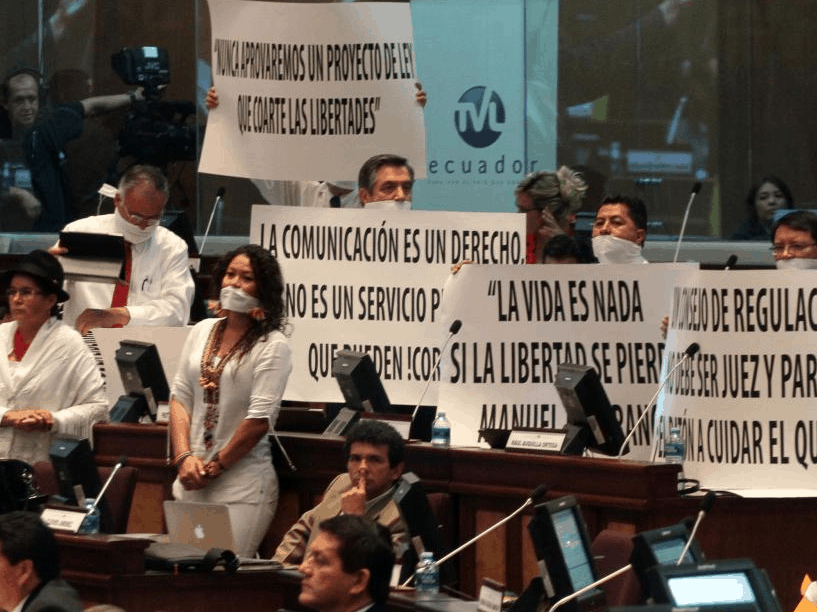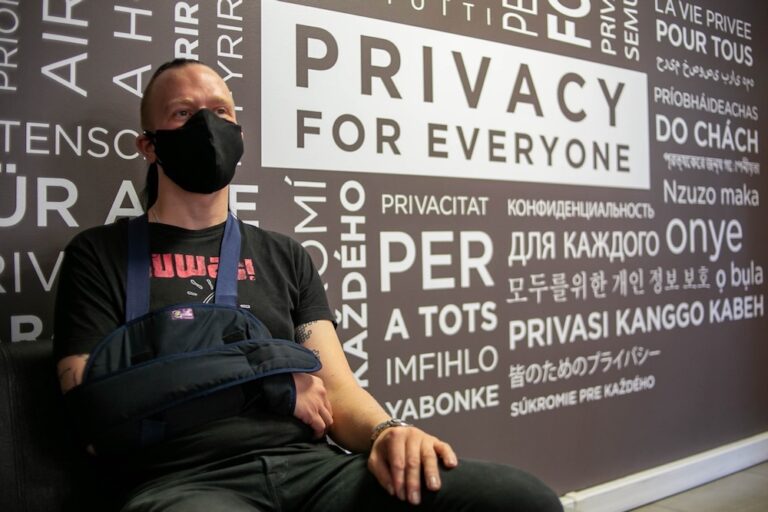Over 30 IFEX members write to President Rafael Correa, calling on him to submit the recently-approved Ecuadorian Communications Law to the Inter-American Court of Human Rights for a Consultative Opinion.
The following is a letter to President Rafael Correa, calling on him to submit the recently-approved Ecuadorian Communications Law to the Inter-American Court of Human Rights (CorteIDH) for a Consultative Opinion. It was initiated by the Andean Foundation for Media Observation & Study (FUNDAMEDIOS), the Committee to Protect Journalists (CPJ) and the Institute for Press and Society (IPYS) and signed by over 30 IFEX members:
Señor Economista
Rafael Correa Delgado
Presidente de la República del Ecuador
García Moreno N10-43 entre Chile y Espejo
Quito, Ecuador
31 July 2013
Dear Mr President,
As a part of the worldwide community of freedom of expression defenders and promoters, and members of the IFEX network, we write to you today to express our profound concern over the recently approved Ecuadorian Communications Law. Both Dr. Catalina Botero and Dr. Frank La Rue, Rapporteurs on freedom of expression and opinion for the Inter-American Commission on Human Rights and the United Nations respectively, have commented on the law.
The Rapporteurs note, in essence, that the Communications Law (recently approved by the Ecuadorian National Assembly) significantly fails to meet international standards that protect the fundamental human right to freedom of expression, and places serious restrictions on the enjoyment of this essential right required for the establishment of a genuinely democratic society.
Dr. Frank LaRue specifically notes that: “This law establishes censorship mechanisms, including the creation of an Information and Communications Superintendence, with the clear objective of limiting the degree to which journalists can express opinions regarding relevant events, public policies and government officials in the country. Officials may agree or disagree with comments made by the press and they have the same right as any other person to respond to those comments, but they must not at any time hinder or censor comments they do not agree with, nor may they limit the press freedom that prevails in all democratic societies. The previously mentioned mechanisms are unacceptable as they constitute violations of Article 19 of the International Covenant on Civil and Political Rights and Article 13 of the American Convention on Human Rights.”
For her part, Dr. Catalina Botero notes the following in communications to the Honourable Chancellor Mr. Ricardo Patiño: “The burdensome regulation imposed on all communications media – press, radio, television, subscription-based audio and video, as well as those media whose content can be created or reproduced via the Internet – is based on the notion that the exercise of freedom of expression through any medium is a public service. In this sense, as it is understood as a public service, the State assumes exorbitant powers to regulate the exercise of the fundamental right to express oneself freely through any medium that a person chooses. (. . .) The law creates a rigorous regulatory framework that imposes scores of obligations applicable to all media and journalists. It authorises the administrative bodies to control and intervene in the content of those media; it establishes considerably vague liabilities and grounds for administrative infractions, and grants a public servant – elected by an administrative body from a short list of candidates sent by the President of the Republic – the authority to oversee compliance with the law, implement it, and impose the respective penalties.”
We know that Ecuador has traditionally respected and promoted the defense of human rights as a signatory to the principal international human rights instruments of both the United Nations and the Inter-American System. We consider and believe that you, Mr. President, are a perceptive leader, desiring to firmly set your country on the path to development and a genuine democracy. As such, we ask you to consider submitting a request for the Inter-American Court of Human Rights to provide a Consultative Opinion addressing the compatibility of the law with standards developed based on Article 19 of the Universal Declaration of Human Rights and Article 13 of the American Convention on Human Rights.
We believe this Consultative Opinion could be decisive in providing legitimacy to the Communications Law, which is currently in doubt.
With our greatest respect and consideration,
World Association of Community Radio Broadcasters – AMARC ALC



